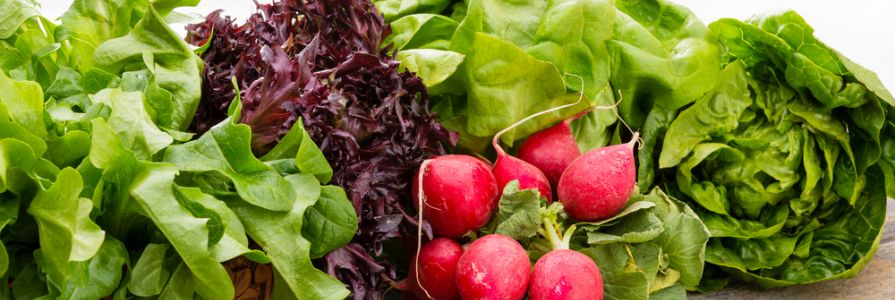When it comes to leafy greens, you get a green light to eat as much as you want — that’s how good they are for you!
As a general rule, you should aim to eat at least five servings of vegetables daily (that’s about 2 1/2 cups of cooked vegetables), and that includes leafy greens. As long as they’re prepared in a healthy way, leafy greens, like other nonstarchy vegetables, are a great addition to your diet and offer countless health benefits.
Leafy greens are full of vitamins, minerals, and disease-fighting phytochemicals. They are rich in fiber, an important nutrient for weight loss and maintenance because it keeps you feeling full and helps control your hunger. Fiber can also lower cholesterol and blood pressure, and help to temper blood-sugar swings by slowing the absorption of carbohydrates into your bloodstream after meals. This lowers your risk of cardiovascular disease and type 2 diabetes. Leafy greens also contain a lot of water, which helps keep you hydrated and contributes to beautiful skin and hair.
Some leafy greens, like collards and kale, are particularly rich in calcium, which helps keep your teeth and bones strong and reduces your overall risk for osteoporosis. Calcium also contributes to muscle function and blood-pressure management. Leafy greens contain potassium as well, which further protects against osteoporosis and helps manage blood-pressure levels.
The antioxidants like vitamin C, lutein, and zeaxanthin that are contained in leafy greens may help reduce your risk of cataracts and macular degeneration. Vitamin C helps the body make collagen too; collagen is a major component of cartilage that aids in joint flexibility, may reduce your risk of arthritis, and keeps your skin and hair healthy and beautiful. Research shows vitamin C may also slow bone loss and decrease the risk of fractures.
Leafy greens that contain beta-carotene, such as collard greens, spinach, and Swiss chard, contribute to the growth and repair of the body’s tissues. Beta-carotene may also protect your skin against sun damage. Beta-carotene is converted to vitamin A in the body, and food sources of beta-carotene are the best way to get your vitamin A fix, since extremely high doses of vitamin A in supplements can be toxic and lead to bone, liver, and neural disorders as well as birth defects. Food sources of beta-carotene are entirely safe, though, since the body regulates how much beta-carotene is converted into vitamin A.
Leafy greens are an excellent source of folate, which can reduce your risk of cardiovascular disease and memory loss. And since folate contributes to the production of serotonin, it may help ward off depression and improve mood.
The vitamin E found in green leafy vegetables works with vitamin C to keep skin healthy as you age. This vitamin also helps protect your skin from the sun’s damaging rays and may help reduce your risk of cataracts and macular degeneration.
While leafy greens offer many health benefits, they can sometimes trigger IBS in individuals who are sensitive. Additionally, if you’re taking a blood thinner like warfarin (Coumadin), be sure to have your doctor monitor your blood and your medication dosage as you increase your intake of dark leafy green vegetables. These vegetables are rich in vitamin K, which plays a key role in blood clotting.






